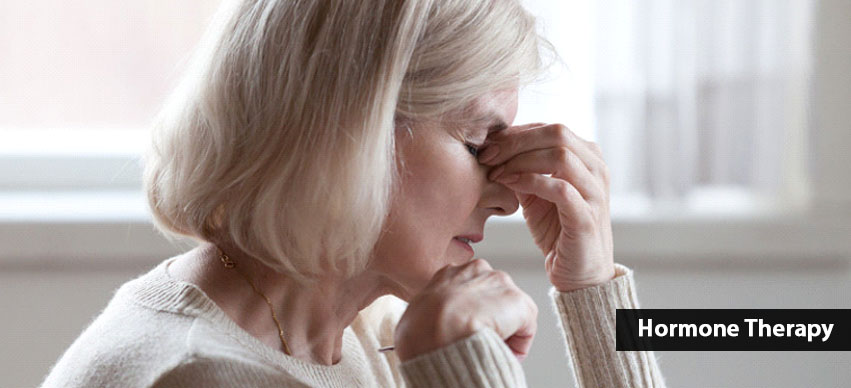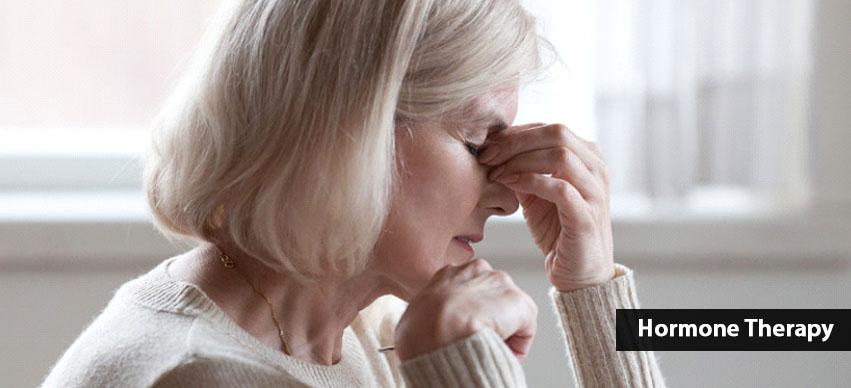Nanoparticle Therapy – An Emerging Cancer Treatment
5 Min Read


The timing couldn't be any worse. At long last, you're feeling comfortable in your own skin. You're feeling confident. Plus, you've managed to survive your teenage kid's wildly unpredictable mood swings and emotional outbursts. Only...yep, it's mom's turn now.
Whether it's the sudden onset of hot flashes, trouble sleeping, or a loss of libido, Menopause can be a tough time in any woman's life. For the longest time, treatments like hormone therapy were a reliable option for when the
"Why am I feeling so hot all of a sudden?" days finally arrived. Unfortunately, this hasn't been the case for a while.
Since 2002, the Women's Health Initiative Study into Hormone Replacement Therapy has led to a number of questions- as well as common misconceptions- being asked of a treatment that, for many years, had helped women through what is a very difficult stage in life.
Amidst the headlines, campaigns, and debates, it's easy to lose sight of the benefits, news, and new studies that have emerged since the industry shake-up in 2002. That's why today we're taking a look at some of the hormone stats, studies, and statistics that you really need to know about.
Following the Women's Health Initiative (WHI) study in 2002, the use of hormone therapy pre-, during- and post-menopause became a topic of fierce debate among medical professionals, within health care circles, and - most commonly - around the family dinner table. Was the risk really worth the reward?
Once the dust had settled on the WHI's findings, professionals and researchers began to examine just what this report had uncovered. One such examination is a study from lead investigator Howard Hodis that directly contradicts some of the original report's findings. In fact, Howard Hodis himself went on to say that "let's becoming increasingly clear that the risks were blown out of proportion".
So, what did this new study find?
Carried out across a 5 year period, this study examined 643 healthy women. Half of them were less than six years past menopause, while the other half were at least 10 years past it. Each of these women was then randomly assigned either oral estradiol or a placebo.
The study found that women who started hormone therapy after menopause had significantly less progression of atherosclerosis in their carotid arteries than those taking the placebo, while those who started later showed no such benefits.
Osteoporosis is an increasingly common, progressive disease that affects as many as 75 million people across Europe, the United States, and Japan. Early on in life, the balance between bone loss and gain remains fairly steady, but once menopause sets in, women begin to lose bone mass at a much higher rate than it's produced.
With some 2 in 3 women over the age of 50 set to experience osteoporotic fractures, a new study from the Lausanne University Hospital in Switzerland set out to, for the first time, investigate whether hormone therapy could also improve bone mass and structure.
Collecting data from the OseoLaus cohort of some 1,279 women between 50 and 80 years of age, this latest study found that hormone therapy did, in fact, improve the bone mass and structure of women they'd examined; higher Trabecular Bone Scores were found in patients undergoing hormone therapy at the time.
More than that, the results also highlighted that the bone health benefits induced by Hormone Therapy persisted at least 2 years after treatment had ended.
"Women at menopause should take note of this study" added Papadakis, commenting on the study, "because its results can help optimize the use of menopausal hormone treatment in women at risk of osteoporosis".
Dementia remains a distant, inevitable dark cloud for many of us, whether you're young or young at heart. New research out of the University of Eastern Finland, however, is showing some promising signs, going as far as to suggest that postmenopausal estrogen-based hormone therapy that lasts longer than ten years may actually help to reduce the risk of Dementia and Alzheimer's disease in patients.
The study looked at the association between postmenopausal hormone replacement therapy disease, dementia, Alzheimer's disease, and cognition, ultimately finding that there may be some cognitive benefits if hormone therapy is initiated around the time of menopause, as this is when neurons are still healthy and responsive.
Since the 2002's bombshell report into hormone therapy, there are many common misconceptions and very real concerns continuing over the use of hormone therapy. Particularly for women who are going through - or have gone through - Menopause.
Attempting to disperse some of the myths, a study conducted at the Cedars-Sinai Medical Center in Los Angeles looked at the health records of more than 4,200 women who had received coronary calcium scans between 1998 and 2012. These are scans that measure the amount of calcium in the heart's arteries (higher calcium levels indicate plaque build-up, which increases the risk of having a heart attack or stroke).
Led by postdoctoral scientist Dr. Yoav Arnson, the study found that women using hormone replacement therapy were 30% less likely to die than those not on hormone therapy. At the same time, hormone replacement therapy users were also found to be- 20% more likely to have a coronary calcium score of - the lowest score - and 36% were less likely to score above 399, a score which indicates a high risk for heart attack and severe atherosclerosis.
Dr. Yoav Arnson summed up the findings, saying "Hormone replacement therapy resulted in lower atherosclerosis and improved survival for all age groups and for all levels of coronary calcium".
As you age, those everyday bumps, trips, and tumbles take on a new significance. The truth is, your body just isn't quite as resilient as it used to be. Especially your bones and joints such as knees and hips.
Research has found that around 2% of patients who have hip or knee replacement will need follow-up surgery within 3 years. Many of these operations are required due to a complication known as osteolysis, which occurs when tiny pieces of the implant seep into the surrounding tissue, causing inflammation that destroys the bone around the implant.
According to WebMD, a new report published by the Annals of the Rheumatic Diseases collected data on more than 21,000 women who had not used hormone replacement therapy after a hip or knee replacement and compared this information with more than 3,500 women who had taken hormone replacement therapy for at least six months after surgery.
Talking on the study, lead researcher Dr. Nigel Arden (director of musculoskeletal epidemiology at the University of Oxford in England) found that there is evidence that drugs like hormone replacement therapy, used usually to prevent osteoporosis and fractures, might have a beneficial effect on implant survival in patients undergoing knee or hip replacement, with the figures showing that those who took the hormone therapy treatment after knee or hip replacement saw their risk of needing a second procedure drop by around 40%.
Fast-forward to 2020, and the question of whether hormone replacement therapy is the right choice for you is as deeply personal a decision as it is a case-specific one. It requires careful consideration, considered discussions, and weighing up the pros and cons as we've outlined today.